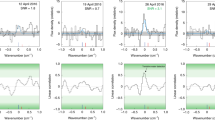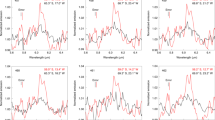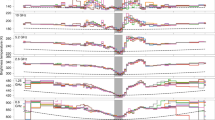Abstract
THERE is no liquid water on Venus. The water vapour in its atmosphere would, if condensed, form a layer only 20 cm deep which means, in contrast to the 3-km-deep oceans that cover its sister planet Earth, that Venus is very dry indeed. It is not known with certainty whether Venus has lacked water since its formation, or if water once present has been lost during its lifetime; the question is of special interest as water is generally thought to be a necessary ingredient for the development of life. The abundance of deuterium in the atmosphere of Venus is an important clue to the planet's history, because ordinary and deuterated water escape at different rates. Using the high-resolution mode of the Inter-national Ultraviolet Explorer (IUE), we measured hydrogen Lyman-α-emission but found only an upper limit on deuterium Lyman-α-emission, from which we inferred a D/H ratio of less than 2–5 x 10−3. This is smaller by a factor of 3–8 than the D/H ratio derived from measurements by the Pioneer Venus Large Probe, and may indicate either a stratification of D/H ratio with altitude or a smaller overall ratio than previously thought.
This is a preview of subscription content, access via your institution
Access options
Subscribe to this journal
Receive 51 print issues and online access
$199.00 per year
only $3.90 per issue
Buy this article
- Purchase on Springer Link
- Instant access to full article PDF
Prices may be subject to local taxes which are calculated during checkout
Similar content being viewed by others
References
Donahue, T. M., Hoffman, J. H., Hodges, R. R. Jr & Watson, A. J. Science 216, 630–633 (1982).
Bertaux, J. L., Goutail, F., Dimarellis, E., Kockarts, G. & van Ransbeeck, E. Nature 309, 771–773 (1984).
Mount, G. H. & Fastie, W. G. Appl. Opt. 17, 3108 (1978).
Paxton, L. J., Anderson, D. E., Jr & Stewart, A. I. F. Adv. Space Res. 5, 129–132 (1985).
Paxton, L. J., Anderson, D. E., Jr & Stewart, A. I. F. J. geophys. Res. 93, 1766–1772 (1988).
Vidal-Madjar, A. & Phissamay, B. Sol. Phy. 66, 259–271 (1980).
Von Zahn, U. et al. J. geophys. Res 85, 7829–7840 (1980).
Kliore, A. J., Moroz, V. I. & Keating, G. M. (eds) Adv. Space Res. 5, 1–193 (1985).
Taylor, H. A., Jr et al. J. geophys. Res. 85, 7765–7777 (1980).
McElroy, M. B., Prattler, M. J. & Rodriguez, J. M. Science 215, 1614 (1982).
Hartle, R. E. & Taylor, H. A., Jr Geophys. Res. Lett. 10, 965 (1983).
Kumar, S. & Taylor, H. A. Jr, Icarus 62, 494–504 (1985).
Kumar, S., Hunten, D. M. & Taylor, H. A., Jr Geophys. Res. Lett. 8, 237 (1981).
Mukhin, L. M. et al. Pis'ma Astr. Zh. 8, 399 (1982).
Author information
Authors and Affiliations
Rights and permissions
About this article
Cite this article
Bertaux, JL., Clarke, J. Deuterium content of the Venus atmosphere. Nature 338, 567–568 (1989). https://doi.org/10.1038/338567a0
Received:
Accepted:
Issue Date:
DOI: https://doi.org/10.1038/338567a0
This article is cited by
-
The D/H ratio and the evolution of water in the terrestrial planets
Origins of life and evolution of the biosphere (1993)
-
Deuterium on Venus
Nature (1989)
Comments
By submitting a comment you agree to abide by our Terms and Community Guidelines. If you find something abusive or that does not comply with our terms or guidelines please flag it as inappropriate.



